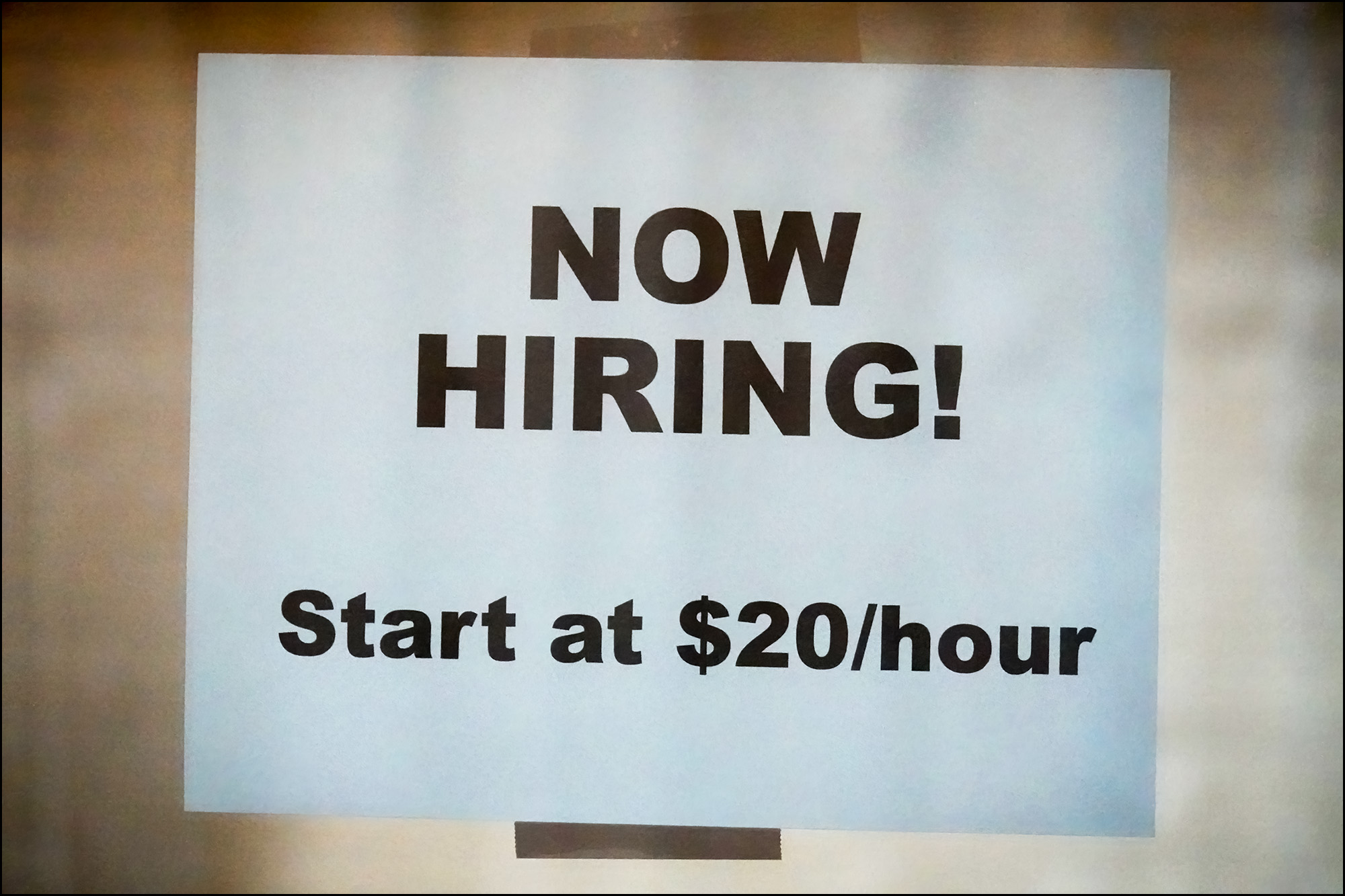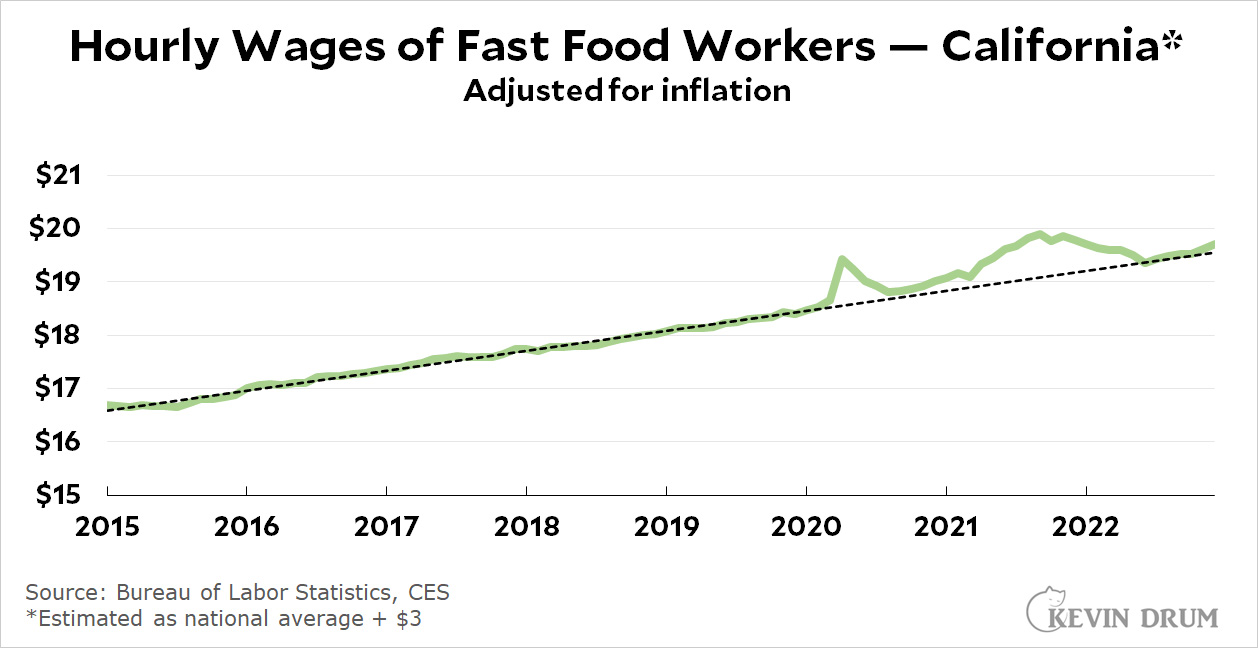Hey there. Have you seen a sign like this lately at a nearby fast food joint?
 That seems pretty excessive, doesn't it? Fast food places must be desperate for workers to offer this kind of money.
That seems pretty excessive, doesn't it? Fast food places must be desperate for workers to offer this kind of money.
But not really. First, of all, you won't see this kind of sign in Oklahoma, where they pay fast food workers more like $13 per hour. The national average is around $17. In California, a high-wage state, the average is a little under $20.
 There's nothing new about this. Before the pandemic, the average hourly wage for a fast-food worker in California was $18.50. Today, after a few ups and downs, it's $19.50. A sign that advertises jobs for $20 per hour is just offering the average.
There's nothing new about this. Before the pandemic, the average hourly wage for a fast-food worker in California was $18.50. Today, after a few ups and downs, it's $19.50. A sign that advertises jobs for $20 per hour is just offering the average.
NOTE: The wage chart is based on Current Employment Statistics data from the BLS for "limited service restaurants," which it defines as restaurants where you order at a counter and then pick up your own food. In other words, it's mostly fast food. The hourly wage figures are an average of all workers. Managers and cooks make more, counter workers make less. And the figure for California is based on the national average + $3, because BLS data shows that for a wide range of fast food jobs California pays about $3 above the national wage.

I’ve seen signs at Peet’s offering barista positions for just under $20 including tips.
Google paid 99 dollars an hour on the internet. Everything I did was basic Οnline w0rk from comfort at hΟme for 5-7 hours per day that I g0t from this office I f0und over the web and they paid me 100 dollars each hour. For more details
visit this article... https://createmaxwealth.blogspot.com
Holy cow! A spam "reply" that actually addresses the content of the comment!!
😄😄😄😄😄
The old saying about an infinite number of monkeys sitting at typewriters...
No. It is AI chatbot spam!
“restaurants where you order at a counter and then pick up your own food. In other words, it's mostly fast food”
Not so in my part of the Midwest.
My go to best fish place is order and wait.
I’ve always referred to it as “fast casual”. Sometimes they bring your food out and sometimes you have to go the counter. It makes little difference. And you refill your own water glass. And get your own utensils and condiments.
I like the savings. And the food is timed perfectly very time. No sitting under a heat lamp.
Like +10! We have a fair amount of this in New Mexico, too.
Been $18-20 in Portland for quite awhile too.
Assuming you can get 40 hours a week consistently (which is unlikely), this nets you around $660/week, a bit less in my neck of the woods because we have local income taxes.
The average monthly rent here on a 1 bedroom is a bit shy of $3400.
As the last reasonable conservative likes to say, "solve for the equilibrium."
That's why apartments on my street that used to house 1 person now house 4.
I don't know what the fast food places are offering, but here on the western edge of Appalachia, Kroger is offering $14 to start.
I like how people here on the east coast were all like "oh restaurants can't afford to pay workers the full minimum wage" completely/willfully oblivious to the fact that 9 mostly western states already do this, and their minimum wages are generally much higher than the federal minimum. Yet, they also have plenty of low- and high-end chain and small businesses everywhere.
And then when I pointed out that places like CA pay tipped employees the full minimum wage, they would snark "well if they did that in DC, I would just have to stop tipping, as I'm sure the prices would go up dramatically." Spoken as we were sitting in a Palm Springs restaurant, paying about the same for our meals as we would have in DC, and with everyone still contributing 20-25% tips.
Ugh. People suck.
Keeeerrrehct! People suck.
Money isn't worth anything anymore.
Plus, it's totally imaginary.
It's a little over $20/hr for drivers in my northeastern state, so local school districts struggle to attract school bus drivers. As a result, they operate with fewer drivers, doubling up the routes. This takes more time, so field trips and sports competitions are affected. The field trips pretty much disappeared. The sports competition travel means that sometimes "student/athletes" must be dismissed in the morning or early afternoon for an after-school event, missing more classes. Additionally, local school districts struggle to find classroom teaching assistants, who can usually find better pay with less stress elsewhere. Add in the skyrocketing housing costs here and you can imagine how the local town councils are looking at spiraling costs to run the schools.
It is not uncommon here in the Boston metro area to see $20/hr for various once minimum wage jobs. In theory it is great. But a lot of these places are operating with far fewer workers than before. $20/hr sounds good until you find out you are doing what was once two jobs.
$20/hr is one thing if you are stocking shelves at Target. It's another thing if you are working dinner rush in an understaffed kitchen.
And rising interest on credit card debt is going to wipe out any extra earnings either way. Funny how we never hear about that anymore.
Rising interest rates on credit cards? All the cards are not at 17 -24 % interest already?
“Estimated as national average + $3”
Is that the BLS’ doing, or a Drum Assumption?
I must have missed the note.
What? No. What?
This is hard work, on your feet, in a high-pressure customer-service environment. And even if it weren't, this would still be too low. Twenty bucks an hour? The hell are you supposed to support a family on that?
That wage rate is not "excessive" even in, say, rural Oklahoma. It's far too low.
People keep doing a thing where they look at a job and come to some conclusion about how much it "should" pay and work forward from there. This is ass-backwards. What you do is determine where the floor should be for a comfortable living and then force all full-time employment to provide at LEAST that remuneration. The economy exists for the benefit of the people participating in it, NOT the other way around.
Many commenters are stuck in the past, where only teenagers still in high school worked fast food jobs, and you could get a burger for a buck. Oblivious to the passage of time, in other words.
So what current jobs are the ones for teenagers? Are really saying every job should pay enough to support a family?
(1) I don't know what the teenage job market looks like. But it's a sad thing when the kids can't just go to school.
(2) The current facts are that fast food jobs too often DO support family wage earners, and so they ought to pay accordingly. Then maybe their kids don't have to take jobs, too.
Yes. If the job is something that is a full-time job, putting in your forty a week should support you and multiple dependents comfortably.
And I reject the whole "jobs for kids should obviously pay less" thing. Why are kids working? If they NEED to work, that's a problem that should be addressed. If they don't need to work, I don't see the issue.
They don't usually "need" to work. They often work to have some pocket money and to learn responsibility and money management. The summer I turned 14 I started working at my neighborhood pool as a "pool aid". (Had to be 15 to be an actual life guard. Pool aids did cleaning, maintenance, etc.) I made $4.25/hour which was the minimum wage at the time. It was great. I had money to spend on what I wanted. At tax time my father taught me how to file my taxes.
You think someone working this job should make enough to support a family? Of course not, that would be crazy.
That said, if companies want to voluntarily pay workers $20 an hour (or $50 an hour), I really couldn't care less. If that's where the market values those jobs, so be it. I'm just arguing against the idea that all jobs are intended to or should support a family.
What, in your mind, are some examples of "low skill jobs" that SHOULD be able to support a family, in order to replace the ones lost when factories moved outside the US?
Jobs for teenagers are any that schedule part-time and operate outside school hours. That doesn't fit for the McDonald's breakfast and lunch service. So clearly those are jobs for adults.
If teenagers used to fully staff every burger joint, maybe it's because Boomers had a 30% HS dropout rate.
Yeah, I think he was maybe being facetious? Regardless, MANY people are most definitely serious when they make those types of comments. It's like they forget how people used to be able to buy a home and support a family by working on an assembly line.
Two points
1. As wages rise, the incentive to substitute alternatives such as technology increases.
https://www.cnn.com/videos/cnnmoney/2018/03/06/flippy-burger-grilling-robot-fast-food-orig.cnn
2. The wage must be placed in the context of its purchasing power. The $20 wage tells me a lot about the cost of living in that location.
https://www.investopedia.com/terms/r/relativeppp.asp#:~:text=Dynamics%20of%20Relative%20Purchasing%20Power%20Parity%20(RPPP)&text=The%20theory%20holds%20that%20inflation,the%20end%20of%20one%20year.
How many orders does it take to pay the wages?
I still remember the ads, "Change back from your dollar". Now it should read, "Change back from your 10 dollars".(or 20?)
Adjust for inflation, and it probably works out--though there is always corporations trying to squeeze more from franchisees.
Yes. I got 16 cents change from my 10 for a burger combo lunch yesterday. If that's what they charge for food, they can afford to pay the workers.
$40K a year is not a lot of money in California, and $40K assumes getting 40 hour weeks for 50 weeks a year. If you assume 1/3 of income for rent, that's $1.1K a month, and good luck finding a place to rent for that in any major metropolitan or resort / tourist area.
When people see the wages of workers who they consider low-status creeping closer to theirs it brings out a lot of feelings about their own place in the world, mostly anger.
The share of America's AGI going to the bottom 50% of workers is now barely 10%. That's a lot of desperate people fighting over a tiny slice of the pie.